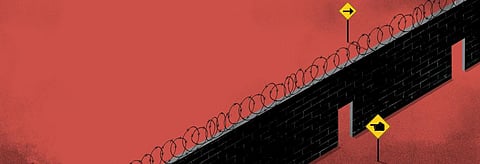

The Centre's Citizenship Amendment Bill (CAB), which seeks to extend the window of opportunity for non-Muslim illegal migrants to India, has run into a storm of protests in Assam and most other northeastern states. The idea of manufactured consent, a long tradition in Indian political processes, has run afoul of public discontent, putting the Bharatiya Janata Party (BJP) on the back foot in a region that it had virtually conquered between 2016 and 2018.
Opposition from within the party in Assam has emerged and BJP has been stung by outspoken anger from its ally the Asom Gana Parishad (AGP), which has quit the coalition. In Meghalaya and Nagaland, where BJP is a small ally to larger regional satraps, New Delhi has been censured for not taking their concerns on board. The Manipur government, led by BJP Chief Minister N Biren Singh, has said it does not want the law applied to the state. The Indigenous Peoples Front of Tripura has said it would withdraw support from BJP-led coalition on CAB’s implementation. The turmoil is likely to affect BJP’s performance in the Northeast in the Lok Sabha elections in a few months.
In addition, the two proposals floated by the Centre to deflect criticism have come a cropper. The first was to add six small Assam communities into the Scheduled Tribes List. The ethnic groups say the declaration falls short of a law and that they wanted CAB to be dropped first. The second proposal to set up a committee to look at another promise made in 1985, of special constitutional safeguards for indigenous people, was a non-starter. Five of the nine members, including MP Bezbaruah who was picked as chair, refused to join in protest against CAB. It is worth noting that the committee did not have a woman member.
Critics have attacked CAB for going against what they say is the core of identity politics in Assam—the 1985 Accord between the Centre, state government and the All Assam Students Union which laid down that all Bangladeshis who came illegally after 1971 would be deported. Religion was not an issue. CAB, while unilaterally setting 2014 as the cutoff for entire India, says non-Muslims (Sikhs, Hindus, Jains, Parsis, Buddhists and Christians) who came illegally from Bangladesh, Pakistan or Afghanistan would be accepted.
CAB has temporarily put the National Register of Citizens (NRC), which earlier aroused much controversy with its goal of picking out non-citizens, into the background. But it remains very much at the heart of the current debate because everything is cross-connected. Over four million people were left out of the draft final list in mid-2018. These included Hindus, tribals and Muslims. Of them, over 3.1 million have filed claims to contest their exclusion. According to the officials, some 0.8 million Bengali Hindus who migrated before 2014 may not make the final NRC cut. That is where the concerns and resistance of local communities need to be seen. There are many complications: NRC is not the only forum for deciding claims and adjudicating who is a citizen. There is the D (Doubtful) Voter process started by the Election Commission to weed out suspected foreigners from electoral lists in 1997. Over 120,000 D voters have been registered in over 20 years. The foreigners tribunals are hearing many other cases.
There are more than 100 foreigners tribunals in Assam; as many as 64 of these were set up in 2015 to kickstart the NRC process, which was dormant till BJP captured power in Delhi in 2014. Of the four million who were left out of the 2018 NRC final draft, as many as 248,000 had been anyway on hold as they had been declared foreigners by D voters (controversially disenfranchised in 1997 and 2005) along with their dependents. The tribunals function much in the nature of courts.
Earlier, tribunal members needed to be retired district court judges or additional district judges. That changed in 2015 when the government declared that a practising lawyer, 55 years of age and with 10 years of experience, could become a member. A burst of activism followed: in just over one year, some 13,000 people were declared foreigners.
According to a government statement in the Assam Assembly two years ago, 79,771 people had been detected as foreigners since 1986, of whom 29,729 were deported. The statement said the police were investigating more than 600,000 cases related to foreigners till October 2016. Of these, more than 400,000 were referred to tribunals where 201,928 cases were pending.
However, the history of the anti-migration movement underlines that promises of detection and deportation are easier said than done. India and Bangladesh do not have a deportation agreement. Dhaka says there are no Bangladeshis in India and it will not accept anyone sent back unless through due process of law. So what happens to those detected as foreigners? There seems to be no plan at all apart from vague assurances. Few states, despite Central assurances, would be willing to take them.
A possibility lies in a clause of the Assam Accord where 75,000 Bengalis who had come from East Pakistan between 1966 and 1971 were disenfranchised for 10 years. Can this be done for a much larger number without prejudice and putting people at risk, or displacing them, without violating statutes and Constitutional guarantees, apart from the un-welcome international attention it would certainly draw? The experience of the long and torturous history of the immigration narrative in Assam shows this is unlikely.
Writer is international director of the Commonwealth Human Rights Initiative
(This article was first published in Down To Earth's 1-15 February 2019 edition)